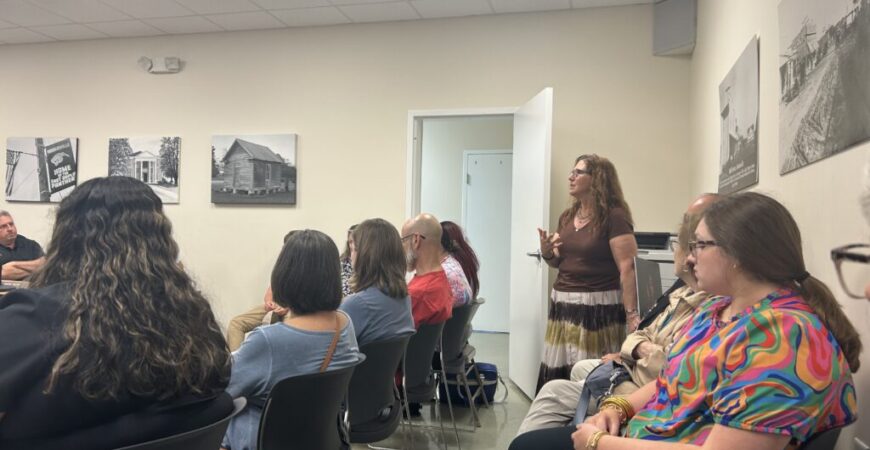BEULAVILLE — An ordinance imposing a 24-month moratorium for hookah, tobacco, vape and similar establishments within town zoning limits was approved unanimously by the Beulaville Board of Commissioners at their regular meeting last Monday following a public hearing that featured testimony from key figures in the state’s crusade against vaping. The board also approved a resolution opposing recent state legislation impacting local zoning and land use controls.
Lori Williams, town manager, recommended the board move forward with the moratorium as the current zoning ordinance fails to effectively regulate vape and tobacco shops, its provisions far less comprehensive than those of nearby jurisdictions.
“The only thing it states is that they are allowed in our commercial district,” explained Williams. “Due to the facts of the dangers of it and the number of those type of stores popping up everywhere, my recommendation is to adopt the moratorium, give our zoning board time to review it, and set some more strict regulations.”
Police Chief Karl Mobley, absent due to injury, had previously expressed his concern over such establishments at the town’s April meeting.
A public hearing preceded the board’s vote on the ordinance that included valuable insight from Ernest Watts, Region 8 Tobacco Lead with the North Carolina Department of Health, and Charlene Zorn, a parent advocate from New Hanover County whose 15-year-old step-son Solomon “Solly” Wynn died due to complications that arose from vaping in June of 2023.
Watts, a veteran in the fight to keep deadly vape devices out of the hands of children, has helped communities in Bladen, Brunswick, Columbus, Duplin, Pender, New Hanover, Robeson, Sampson and Onslow counties in implementing tobacco-free policies since 2012. After hearing of the board’s intention to hold a public hearing for the proposed temporary moratorium last month, he contacted the town to offer assistance in drafting the ordinance.
“This gives you a time to put something that will stand up in court — it will also give you an opportunity to look at the concept of emulsion,” advised Watts. Through emulsion, he explained, any business operating as anything other than a vape shop (such as a laundromat, gas station, convenience store, etc.) that exceeded a board-determined limit in sales of vape or vape paraphernalia could have its business license pulled by the board. Though the ordinance wouldn’t affect existing shops, it would create barriers to vape accessibility near residential areas, churches and schools. Watts advised the board that they were able to set any rate or distance limit they wanted, and offered to assist in the two-year process. He also emphasized why such regulations were important and cautioned the board about the battle ahead.
“Now we’re seeing fentanyl, we’re seeing THC — anything that can be liquefied can be used for vape,” Watts warned. “We’ve got vapes that look like dolls, we’ve got vapes that look like Toy Story characters, hoodies where the string is a tube… We had one in this county, a fifth-grader that was selling vapes at $5 a puff on the playground — it is rampant. You’re going against a billion-dollar industry, and that’s just a fact.”
Zorn was the next to speak. “I need to do anything I can do to make sure nobody else’s parent loses their child. I have been to the legislature, been anywhere I could go within the state to convince everyone that we need to work together to get rid of these vape shops to save our kids.”
Zorn’s step-son died just 10 days after his 15th birthday, the youngest example of a vape-induced death in the state of North Carolina. A bill in his honor called ‘Solly’s Law’ is currently working its way through state legislature as House Bill 430, sponsored by Representative Donnie Loftis (R-10), and Senate Bill 318, sponsored by Senator Gale Adcock (D-16). The bill would require a tobacco retail sales permit for businesses and raise the age to purchase tobacco and vape products in the state from 18 to 21. “These kids don’t know what they’re doing to their bodies,” she explained.
Following testimony from Watts and Zorn, the board voted unanimously to move forward with the temporary moratorium.
Also on the agenda was a resolution to oppose state legislature that seeks to limit the authority of smaller municipalities as regards zoning and land-use planning — specifically SB495, SB497, SB498, SB688 and HB765. According to the resolution, “these bills change many aspects of local planning and zoning and dramatically affect the ability of local governments to reflect the will of their citizenry.”
“The biggest things are regulating our residential areas. The state will pretty much tell you what can go there,” said Williams. “They’re putting a lot of restrictions on what the town’s planning can and cannot do.” Williams added that limitations on application turnaround timelines were also being imposed with the new legislation. “That kind of slaps you on the hand, because you have to advertise so many days for public hearings, give the public time to comment before the town council can make a decision.”
Williams confirmed in a response to Wickeline that the state had no communication with the League of Municipalities prior to bringing the legislation. “And there’s a ton of opposition from most municipalities,” added Mayor Hutch Jones. “There’s a lot of this that leaves you scratching your head.”
In other business, the town approved a resolution accepting a $2.7 million Community Development Block Grant for Infrastructure from the North Carolina Department of Environmental Quality. The grant will cover sewer improvements, which will include rehabilitation at the treatment plant as well as facilitating the replacement of sewer lines in southern Beulaville.
 Twitter
Twitter Facebook
Facebook Instagram
Instagram





